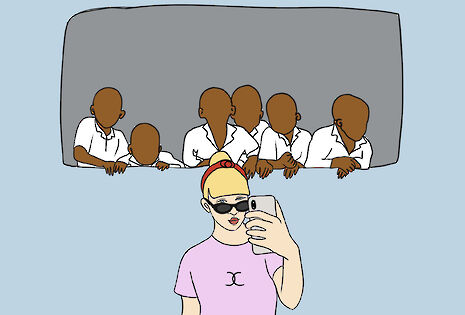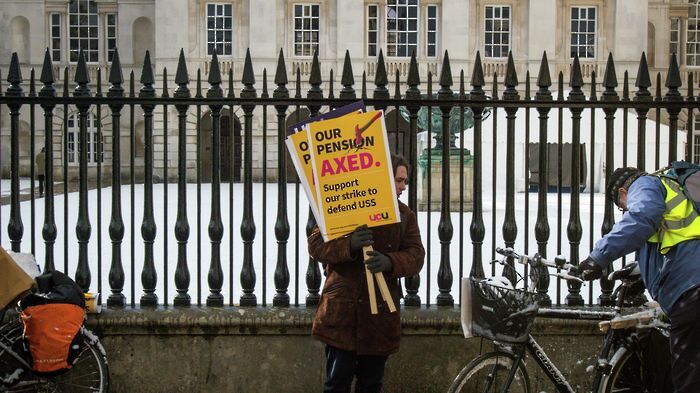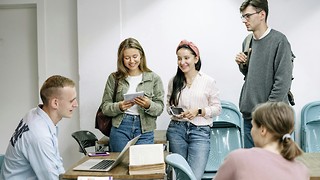Voluntourism is damaging. Period.
Folu Ogunyeye argues that the ‘White Saviour Complex’ underpinning voluntourism is causing more harm than good

As exams finish and May Week draws to a close, the long break looms over every Cambridge student, anxious to fill it with something exciting. Making a positive impact through volunteering can sound much more appealing than sitting in a corporate office all summer, and even more so is the opportunity to combine voluntary work with a holiday in an exotic location.
It comes as no surprise, then, that an industry exists to provide exactly that: the rapidly growing voluntourism industry is worth over $2 billion annually, meeting the demand of a generation known for being more socially conscious and globally interconnected than ever before. For volunteers, the experience provides many benefits: cultural enrichment, self-discovery, impressive CV content — all whilst helping those in need. Yet, as global inequalities between wealthy and poorer countries persist, we need to ask, “Who is really benefiting from voluntourism?”
Voluntourism reinforces an economic structure that is dependent on foreign intervention rather than autonomy
Although intentions can be well-meaning, it has been proven time and time again that voluntourism not only benefits the volunteers and Western-based organisations the most, but also damages the local economies and individuals that were meant to be ‘helped’ in the first place. As an industry with no form of international regulation, there are no rigorous measures in place to protect the communities from exploitation by voluntourism companies or the volunteers themselves. For example, orphanage tourism has led to children who are not actual orphans being bought from their parents in order to meet the increasing demand for volunteering opportunities.
Hoping to give their children a better education, parents are scammed into placing their children at risk of abuse and exploitation by the orphanage companies. In addition, interacting and bonding with volunteers that come and go every few weeks can impair the children’s social and cognitive development as they cannot form long-lasting relationships. From an economic perspective, voluntourism structurally disrupts local economies by taking away jobs that can be performed better and faster by local workers, contributing to high unemployment rates. This is clearly seen in voluntourism projects involving construction work, carried out by individuals with no prior experience, which then has to be torn down and redone by qualified local workers, if the extra costs can be afforded. In the long term, voluntourism reinforces an economic structure that is dependent on foreign intervention rather than autonomy.
Causing harm without immediate repercussions is a privilege that applies to all volunteers, regardless of the scale of collateral damage
How can so much damage come from a seemingly innocent desire to do good? One major factor at play is the White Saviour Complex, which is the underlying narrative that drives the voluntourism industry. In short, it centres a ‘Third-World’ victim in need of rescuing, with the position of ‘hero’ occupied by white people from the West, determined to help those who cannot help themselves. The narrative then revolves around the perspective of the ‘White Saviour’: motivated to make a difference abroad, heartbroken upon witnessing poverty firsthand, but eventually enlightened about the privilege that life in the West offers. With this focus, the needs of those supposedly being helped are overlooked, which can have disastrous consequences: Renee Bach, an American missionary who moved to Uganda to set up a malnutrition clinic, is being sued by two Ugandan mothers whose babies were killed under her care, alongside 117 other infant deaths. Bach has no formal medical qualifications. This situation would be inconceivable were an unqualified Ugandan to open a medical clinic in the UK and treat children. Whilst this may be an extreme example, the ability to cause harm without any immediate repercussions is a privilege that applies to all volunteers, regardless of the scale of collateral damage. Beyond the voluntourism industry, this racial bias can also be seen in the media and foreign policy, where problems in non-Western countries are highlighted as a justification for intervention, whilst similar domestic issues are overlooked.
It’s clear that the White Saviour Complex is a pervasive issue which exists on a large scale, but that does not mean that you can’t do anything to make sure that you’re not contributing to it. As a Cambridge student, you can apply your critical thinking skills beyond your supervisions and ask yourself a few questions:
- Are you qualified to do the work that you plan on doing?
- Are you taking away jobs that others (who are actually qualified) need to live?
- Are you doing work that is beneficial in the long run, without your physical presence?
It is also possible to help people in need without flying to the other side of the world. Instead of teaching English to children in Africa, tutoring disadvantaged students from a struggling state comprehensive school can have a greater and more positive impact. In addition, helping local charities and social enterprises overcome their problems by offering free consulting, or working with local organisations to address seasonal issues (for example, holiday hunger, a condition that occurs when a child’s household is, or will, become food insecure during the school holidays) can be an incredibly rewarding use of time and resources. This and so much more can be done right here in England, and are more effective ways of utilising your skills without causing any unintended harm. None of this is to say that you cannot or should not support whenever an issue abroad resonates with you.
Donating money to locally based and led organisations, who most likely to have the technical and cultural expertise to use it effectively without your oversight, however, is a much more ethical and sustainable way of supporting. Technology has enabled the rise of online volunteering, which enables you to contribute your skills without interfering with local autonomy.
For more information on alternatives to voluntourism, visit: https://nowhitesaviors.org/resources/
Folu Ogunyeye is the International Development Officer at the Cambridge Hub, which is a student-led group that offers and publicises impactful Cambridge-based volunteering opportunities through events, social media and a weekly email newsletter.
 News / Cambridge academics sign open letter criticising research funding changes22 February 2026
News / Cambridge academics sign open letter criticising research funding changes22 February 2026 News / Student and union protesters hold ‘Trans Liberation Solidarity Rally’ 24 February 2026
News / Student and union protesters hold ‘Trans Liberation Solidarity Rally’ 24 February 2026 News / Union speakers condemn ‘hateful’ Katie Hopkins speech14 February 2026
News / Union speakers condemn ‘hateful’ Katie Hopkins speech14 February 2026 Features / Beyond the porters’ lodge: is life better outside college?24 February 2026
Features / Beyond the porters’ lodge: is life better outside college?24 February 2026 Theatre / Footlights Spring Revue? Don’t Mind if I Do!25 February 2026
Theatre / Footlights Spring Revue? Don’t Mind if I Do!25 February 2026









